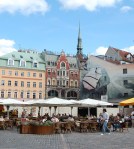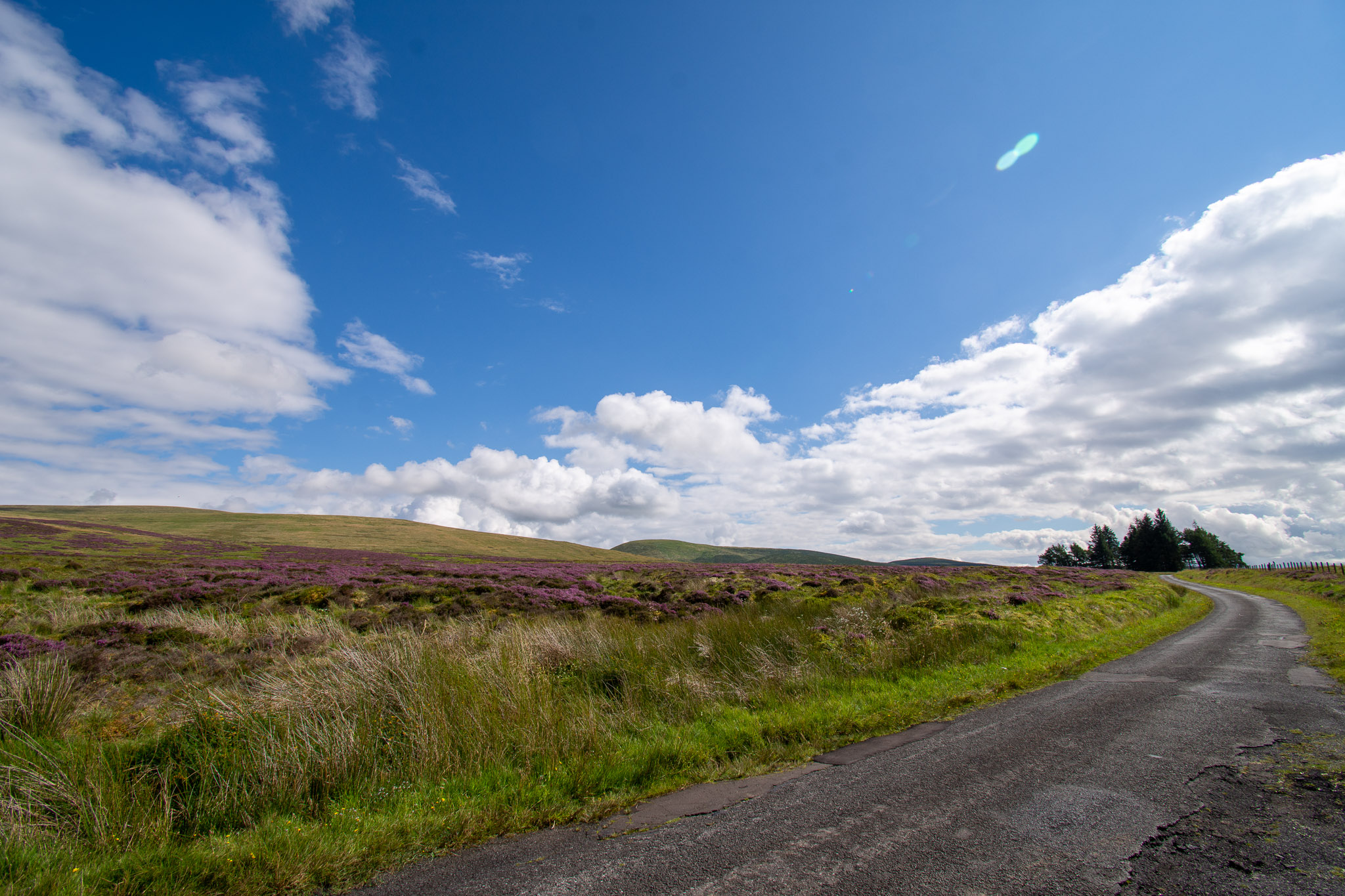We arrived in Estonia in mid-November 1995. The entire Baltic region was in the throes of a massive blizzard upon our arrival; I didn’t actually see the ground until late April.
I love snow, cold weather, and winter sports (my favorite of which is sitting in front of a blazing fire with hot cocoa or wine—yes, that’s a sport in my book). What I was not prepared for was the lack of sunlight at 58 degrees North Latitude. Although there are rumors that Estonians enjoy the sun from around 9 in the morning until 3 in the afternoon, in the winter months, it clearly depends on how you define sun. And enjoy for that matter. With the combination of a sun hanging so low in the sky that it barely peeks above the horizon and almost daily snowfall, dawn seemed to extend into dusk. And we called these gray hours in between the two: Daytime—more out of habit than appearance.
My step-daughter, Debra, stayed with us for the first few weeks in Tartu, before moving up to Northern Estonia for several months to teach English as a second language and then returned to the States. My nephew, David, also stayed with us for about 4 months before returning to the States.
Very early in the morning, within the first week of our arrival, the phone rang; Debra answered it.
“Hello,” she said, as I jumped from my bed, assuming that only an emergency from the States would have our phone ringing at such an hour. Debra’s expression was quizzical as she silently listened for what seemed like forever before handing me the phone. “Some guy is singing Rain-drops keep falling on my head in English but with a strong accent and off-key. I have no idea…” As I took the phone, Debra returned to her bed.
The assumption was that I had some idea. I did.
20 hours earlier (more or less)
It was perhaps our second, possibly third, day in Estonia, that I began what became my daily routine of crawling out of bed, despite the darkness, and going out for a morning walk. On that first morning walk I dragged David out of bed to join me.
Estonia was pristine and quiet in the dim November light as we walked through the falling snow, laughing and inspecting our new world. We didn’t know it at the time but we were walking in an area of Tartu known as Souptown. During Soviet times, the government attempted to change all street names that reflected national heroes from the country’s past. In fact the Soviet Empire liked folks to pretend that they had no past; instead they were all created on the day they were kidnapped by—whoops, I mean incorporated into—the USSR. So when Moscow looked at the tiny country of Estonia and saw a section of Tartu that had streets apparently named after their heroes—who just happened to have last names like Potato, Cabbage, Carrot etc.—Moscow demanded that Estonia change the street names to more appropriate names like Lenin, Stalin and Lucky-us-to-be-in-this-great-new-experimental-fuster-cluck. The Estonians, however are a clever lot—at least when compared to the drunken Moscow bullies. They replied to this request for name changes with a seriously innocent letter that said something like: “Our Dearly Beloved Comrades Who Art in Moscow: We see no reason to change the names of these streets since they are named after our favorite soup ingredients. And you know how we love our soup! Surely you will agree that this would be a great nuisance and expense for no reason.” Moscow agreed and the name Souptown was born, living within the quiet chuckles of the Estonian people. In 1995, pensioners and very poor people inhabited Souptown but it was clean and quaint; a great place to walk.
Okay, I broke tangential there for a minute … now back to the story.
So David and I were walking down the street, when I heard someone address me in English.
“Hello, Madame; are you French?” A male voice asked.
I looked above me and standing on a slight hill was a young man grinning from ear to ear wearing a leather mail carriers pouch—bulging with letters—slung across one shoulder
“No, I’m American,” I replied in English, partially because he’d spoken to me in English but primarily because it’s the only language I spoke.
“Sprechen Sie Deutsch?” he asked.
“Um… nein.”
“Parlez-vous français?” he asked
“Non,” I replied. “Didn’t we already establish that I’m American and I speak English?” I asked.
“Did we?”
“We did in my mind.”
“Hm… Okay. I’ll speak English wis you but I speak many languages,” he said with a notable lack of modesty.
“Apparently.” I wasn’t impressed; I was slightly amused.
“What is your name?” he asked.
“Holly.” I have no idea why I answered him.
Seemingly unaware of David, he said, “Do you has a man in your flat?”
“I can’t imagine anything that might be less your business.” I turned to walk away.
“No wait. Wait! I’m sorry. I never see so interesting people as you and I’m so exciting to meet such foreigners in zis cold, fucking, Soviet piece of shit country.”
“Nice language,” I said.
“Sanks!” he replied enthusiastically. “I also speak Russian, Estonian, Ossetian and Georgian.” He thought I was complimenting his English. I chose not to correct him.
He turned to David, “I didn’t mean you weren’t man but you are … hm… a boy really. Skinny and um… I don’t know…” He looked somewhat disapprovingly at David.
“We might discuss his social skills at some point if we get to know him,” David whispered, a chuckle clearly lodged in his throat.
“There’s no if, Dave,” I said. I honestly had no intention of seeing this man again. Ever.
“And vhat’s your name?” he asked my nephew.
“David and I’m Holly’s nephew.”
“Oh I so love zis name! Okay, I am named Avto and you vill be my new best friends from America,” he said resolutely, suddenly clapping his hands and laughing loudly. Apparently owning the name David (or perhaps being my nephew) bumped David up a notch in Avto’s opinion. “I vill call you Hole and Davidito. Americans love nicknames so zeese vill be your new names, from me: Your new best friend, Avto.”
“So can we call you Avtomobile?” David asked.
Avto laughed from his belly. “Of course, if you want, but the real name is Avtandeel. I am from Georgia, the country not zee American state,” he finished. It was good to have that potential misunderstanding cleared up early on.
“We don’t actually want to call you Avtomobile,” I said, feeling slightly uncomfortable about humour made at Avto’s expense.
“Yes, this is very long. Perhaps better would be Avi.”
“Okay, then,” David said, “We’ll see you around, Avi. Nice meeting you.”
“Give me number of phones,” Avto said grabbing an undelivered envelope from his mail pouch, and a pen from his pocket.
“Dude, you can’t write on someone’s mail!” David said.
“Oh yes; it’s okay. I know all of zeese grannies and granddaddies. Zey are like my family.” He handed me the envelope.
I have no idea why I gave him our phone number that morning; destiny, I suppose.
Fast Forward 20 Hours Or So
“Some guy is singing Rain-drops keep falling on my head in English but with a strong accent and off-key … I have no idea …”
Debra’s assumption was that I had some idea. I did.
“Good morning, Avi.” I said into the phone. I didn’t have to ask who was on the line. Such eccentricity was scarce, even in my life.
“Brilliant morning, Hole! I can call you Hole, right?”
“Um, well I need to think about that. But, meanwhile, please don’t ever call before 7 AM, okay? And don’t sing into the telephone because it’s kinda … it’s just weird,” I said. I recall thinking This might not be the weirdest thing Avto does but if it’s all this harmless, I can deal with it.
“Uh huh… Okay,” he said, in a way that led me to think he’d been given advice like this before.
After a short conversation, in which he outlined my only problems in life being my need for fresh air, sunshine and exercise, Avto said, “I vill let you wis me on my mail route when I deliver every day post and pension money every month. And sometimes I help zese old people wis life. You vill see inside of houses and pet cats and maybe have tea wis us … . We must can begin today.”
I’m not sure why that idea was even up for debate—given the early hour and the improbability of my enjoying Avto’s peculiar company—but I threw on my clothes and joined him that morning and almost every morning after that for many months, as he delivered his post. I drank tea with the pensioners, pet their cats, warmed myself by their woodstoves and I learned what Avto meant when he said he “helped zem wis life.”
Anyway… I wanted to introduce you to Avto before I went further into this blog because he was such a character in my life and I enjoyed my time with him immensely—for the most part… Eccentric relationships are seldom the easiest but they can be incredibly rewarding and they make for great stories.


